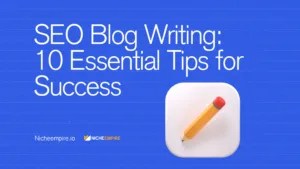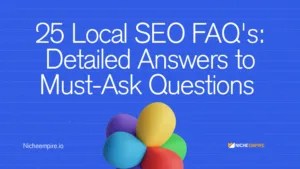Imagine your small business reaching a large audience and your sales increasing massively. How would you also feel if your website attracts more of your target audience? That sounds good, right?
This is what happens when you effectively leverage SEO strategies. To create a strong and targeted online presence as a small business owner, you need Search Engine Optimization. It is one of the indispensable tools every small business needs to thrive.
This is why we have compiled these DIY SEO for small businesses strategies to help you improve your search rankings and online marketing strategy.
Summary
- DIY SEO Strategies You Need To Boost Your Rankings
- Understand the Basics of SEO
- Conduct Keyword Research
- Explore Content Creation and Marketing Tactics
- Extensive On-Page SEO
- Improve Technical SEO
- Develop Good Backlinks
- Track and Adjust Your SEO Approach
- Final Thought
- FAQs
DIY SEO Strategies You Need To Boost Your Rankings 
Below are essential tips to help you boost your rankings and attract more customers:
1. Understand the Basics of SEO
Before diving into SEO, you must be familiar with key concepts, such as keywords, on-page SEO, and off-page SEO.
- Keywords are phrases or words your potential customers use to search for products and services in your field.
- Optimization made directly on your website, such as images, content, and meta tags, is known as On-page SEO.
- Those SEO activities conducted outside your website to enhance its authority, mainly through backlinks, are known as Off-page SEO.
2. Conduct Keyword Research
Keyword research is undoubtedly the bedrock of any effective SEO strategy. It has to do with finding words your target audience usually uses when searching for products or services similar to yours.
- To make an effective keyword search, conduct a practical search intent analysis. Ensure you understand the purpose of the keywords to optimize your website effectively.
This is crucial as SEO is ineffective without a clear SEO strategy. Ask these questions before choosing keywords for your small business SEO strategy.
- Will these keywords help my small business get better visibility?
- Are the people searching for these terms trying to purchase, find a place, or learn about something related to my business?
Always ensure your content matches the intent of your audience.
- After determining your search intent, you can come up with a list of fundamental keywords that define your business.
For instance, if you run a cafe, your core keywords may include “cappuccino” and “coffee.”
- However, long-tail keywords are better. They usually have less competition and high conversion rates, making them ideal.
For instance, instead of “coffee,” “best coffee for a cappuccino” will be more specific and easier to rank for.
- You must also consider the competition level (difficulty) of your keywords. Targeting low-competition and high-volume keywords is better, as they increase your chances of ranking high.
You can use keyword research tools like Niche Empire, SEMrush, and Ahrefs to find relevant keywords.
Google Keyword Planner, Ubbersuggest, and Answer the Public are also good and free to use to find keywords.
3. Explore Content Creation and Marketing Tactics
Creating high-quality content requires strategic efforts and is essential for attracting more visitors. Let’s look at some marketing and content-creation tactics:
- Regular Content Creation
Be consistent in your posting schedule, whether weekly, bi-weekly, or a few times a month, to improve your local SEO.
Also, the content you publish on your website should answer your target audience’s questions, needs, and interests. Use your keyword to create content that aligns with what your audience is searching for.
You can also consider answering frequently asked questions, offering recommendations to your audience, and resolving issues. This contributes to creating high-quality content that provides value.
- Explore Different Content Formats
Don’t limit yourself to only one type of content format. You can try including other content forms like podcasts, webinars, videos, and infographics to your content strategy.
However, your content format will depend on your preferred platform for content distribution. For example, videos and images are ideal for using Pinterest or Instagram to promote your business. Remember, you must be on the platforms where your target audience hangs out.
You don’t have to bother about creating multiple forms of content; you can easily repurpose your content. Turn your blog posts into a series of social media posts, short-formed videos, or podcasts.
- Promote Your Content
Prioritize sharing your content on online forums, communities, and social media platforms and build email subscribers. Interacting with a wider range of audiences using these online channels can draw traffic to your site and business.
You can also collaborate with popular influencers or leaders in your field to promote your content and business visibility.
Don’t miss our detailed guide on SEO writing.
4. Extensive On-Page SEO
On-page SEO means optimizing the pages on your website to rank higher and attract relevant traffic. Below are the key points to focus on about On-page SEO:
- Use Meta Descriptions and Title Tags
Write captivating summaries – meta descriptions between 150 and 160 characters that point out the main content of your page. These summaries should be good enough to persuade people to click.
Your title tags shouldn’t exceed 60 characters to ensure good SEO title practice. Incorporate your keywords in your titles and meta description and ensure they correctly reflect the page’s content. Keep your keywords natural and provide a clear call to action.
- Use Headers (H1, H2, H3)
Make use of header tags to organize your content. The H1 tag should include your main keyword and the page’s main topic summary. H2 – H6 should be used for subheadings to make your content well-organized and easily read.
- Properly Structure Your Content
Ensure your content structure is easy for readers to follow and understand. Use bullet points, lists, and visuals to break text and improve readability.
Make your paragraphs short and avoid using complex and hard-to-understand sentences. Include your keywords naturally, and don’t overstuff keywords so you don’t get penalized.
- Optimize your Images
Add descriptive file names and alt text for images to increase visibility in search engines and ease of access for users with visual impairments.
For instance, use “cappuccino coffee recipe.jpg” as a file name instead of “image1.jpg.”
Find out more about image SEO.
5. Improve Technical SEO
Technical SEO involves the backend of your site. It ensures that your website performs well and your visitors have a good experience. This is essential because it satisfies the requirements needed by search engines.
Here is how to improve technical SEO for small businesses:
- Improve your Site Speed
Compress your web images. Also, tools like Google PageSpeed Insights can help you analyze your site’s speed and highlight the parts that require improvement. A loading time of not more than 3 seconds is ideal.
- Decrease Server Response Time to the Barest Minimum
Select an effective hosting provider. Also, consider using a content delivery network (CDN) to help distribute your content across several servers.
- Ensure your Site Mobile-Friendly
Your website should be very responsive and offer a top-notch user experience on mobile devices. Use responsive design tactics, like flexible grids and buttons for different screen sizes.
You can also use the mobile test tool provided by Google to check how well your site works on mobile devices. Mobile-friendliness is vital for ranking.
- Ensure your Website is Safe
To build user trust, you need to make data transfer secure. This is vital for your business SEO strategy and contributes to your website ranking.
Check your website frequently for security flaws and take appropriate measures to guard it against potential threats. In addition, you can request an SSL certificate from your hosting company, increasing customer trust in your website.
6. Develop Good Backlinks
It is no news that backlinks are an essential part of Off-page SEO that can significantly affect your ranking. Let’s explore ways you can build a backlink effectively:
- Leverage on Guest Blogging
Research reliable blogs in your field and submit guest post ideas that give value to their audience. It can be within your author profile or in the content.
You will have the opportunity to earn backlinks to your website and improve brand awareness and credibility.
- Partner with Others
No man is an island; it also applies to businesses. Collaborate with local businesses or influencers for co-marketing initiatives, like promotions, events, and joint webinars.
This will increase your visibility and can get your backlinks and mentions. Offer value and engage with online and offline communities in your niche to build strong relationships.
- Create Shareable Content
Create quality shareable content like infographics, short videos, and engaging social media posts that can go viral. You can also create valuable resources like eBooks and toolkits that provide solutions to your target audience.
Promote your shareable content on social media platforms to reach more people and drive traffic to your website and store.
7. Track and Adjust Your SEO Approach 
SEO is a continuous process; monitoring is key to ensuring you are on the right track. To effectively track your SEO performance, use these analytics tools:
- Google Analytics
Google Analytics is a free tool for tracking web traffic, conversion rate, and consumer behavior.
You can use it to monitor your website visitors’ behavior and organic traffic. The pages they visit, the content they view, how long they stay, and the traffic source.
It will help you decide which pages and content are performing well and which need improvement.
- Google Search Console
Google Search Console reveals how Google sees your site. It provides information about your site exposure, indexing position, and keyword performance and identifies crawl issues.
Final Thought
It is not usual for business owners to avoid SEO because they worry about the complexity, but it is not difficult.
Understand your target audience and their intentions when they make inquiries on search engines and create content with keywords that meet their needs.
Ensure your website is fast and mobile friendly, create different content formats, and promote across multiple platforms to reach a wider audience.
Use these DIY SEO for small businesses tips will help you reach your target customers.
Remember, SEO takes time; stay consistent, and your business will reap the reward in time.
FAQs 
Can I do SEO by myself?
Yes, you can do SEO by yourself.
You will have to understand SEO terms and practices like keyword research, On-page, Off-page, and technical SEO to make your business appear high on search engines.
We covered these in this article and several other articles on our website.
Can I do SEO for my own business?
You can do SEO for your business.
- Understand your target audience, their needs and concerns, and find keywords they use to make searches online.
- Use the keywords to create helpful content that answers their concerns.
- Collaborate with other small businesses in your area to reach a wider audience.
- Promote your content across multiple platforms and communities to improve brand awareness and credibility.
- Compress your website images and ensure your website is fast and mobile-friendly.
Can SEO be done for free?
SEO can be done for free if you do it yourself and use free tools. While you can still get results from free tools, they are often limited and take longer.
Does SEO work for small businesses?
SEO works for small businesses. It can help you appear high on search results when potential clients find your products or services.
It is a cost-effective form of marketing that builds your business awareness and credibility and generates more leads and sales.



